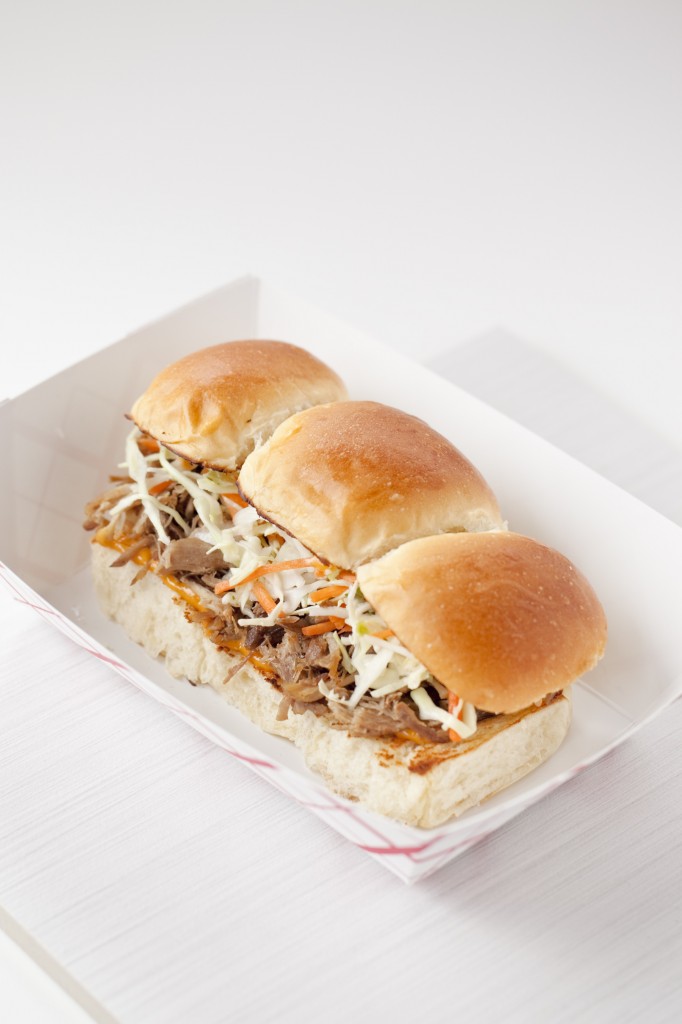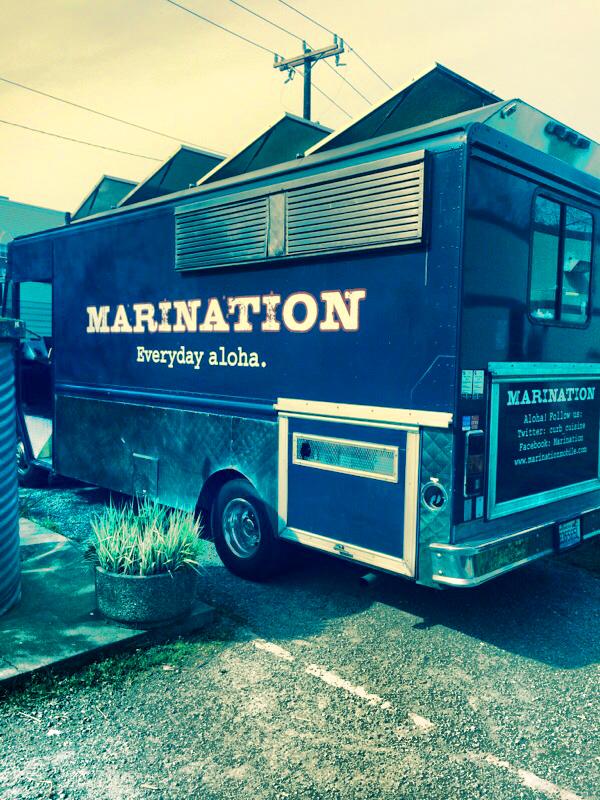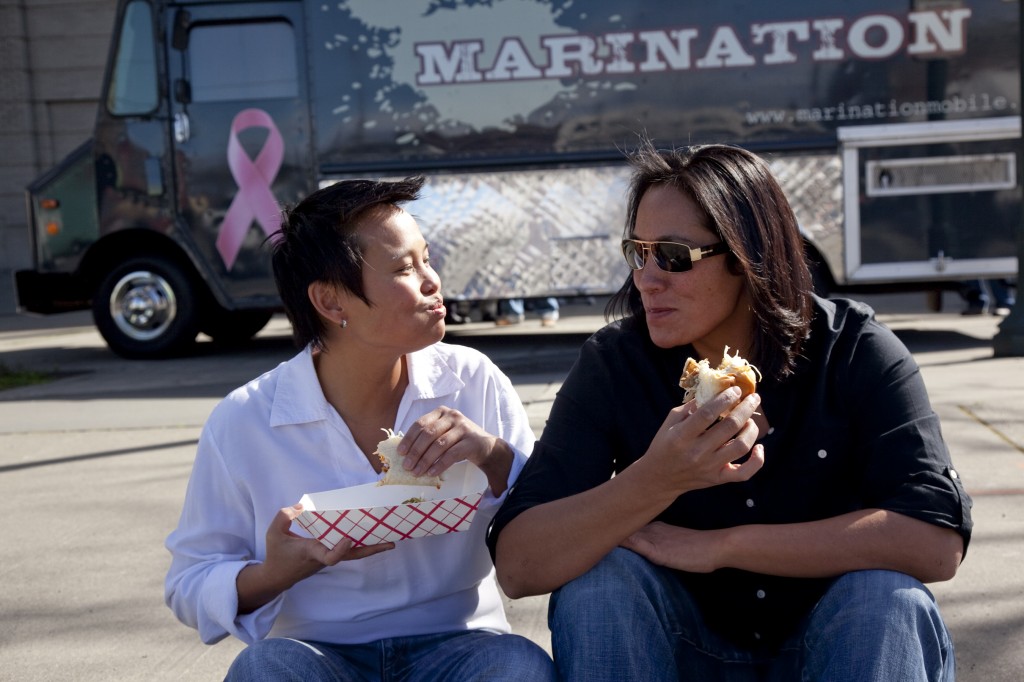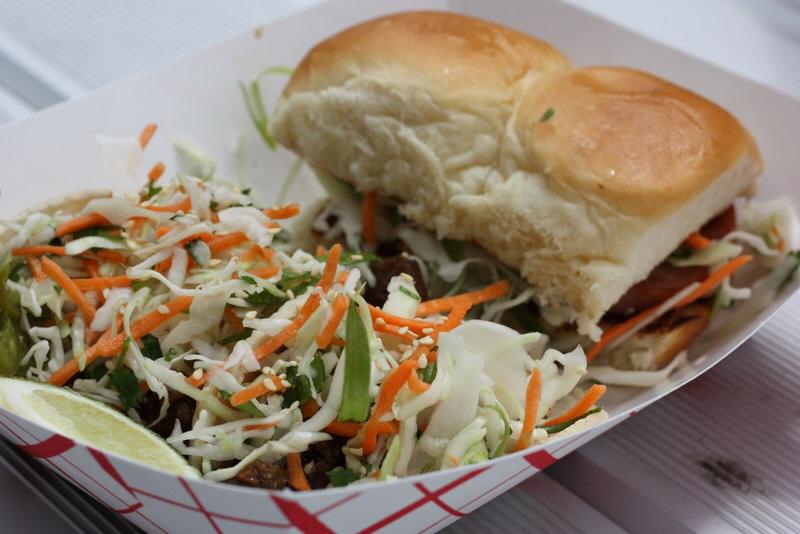- California Assembly OKs highest minimum wage in nation
- S. Korea unveils first graphic cigarette warnings
- US joins with South Korea, Japan in bid to deter North Korea
- LPGA golfer Chun In-gee finally back in action
- S. Korea won’t be top seed in final World Cup qualification round
- US men’s soccer misses 2nd straight Olympics
- US back on track in qualifying with 4-0 win over Guatemala
- High-intensity workout injuries spawn cottage industry
- CDC expands range of Zika mosquitoes into parts of Northeast
- Who knew? ‘The Walking Dead’ is helping families connect
When Korea met Hawaii in Seattle
As a pioneer of Korean-Hawaiian fusion, Marination Mobile became an instant hit
This is the third in a series featuring some of today’s most popular Korean food trucks in the U.S.
SEATTLE — Think SPAM is junk food?
Not at Marination Mobile, not at the incredibly popular Seattle food truck where the mystery lunchmeat is cooked, served and devoured like delicacy.
Here’s how Marination Mobile does it: Take a few generous slices of Spam, grill it to sizzling perfection, dress it with their signature sweet and crunchy slaw and douse the stack with their famous Nunya Sauce right before tucking everything in a warm, fluffy and pillowy soft Hawaiian bun.
Now see if you can call that junk food.
The entire slider vanishes in only a few bites, making each and every chomp even more finger-licking good. So what makes these mini sandwiches so yum?

Marination Mobile’s best-selling menu is their Aloha Sliders, Hawaiian-style braised kalua pulled pork stuffed in a Hawaiian sweet roll with Nunya Sauce and signature slaw.
Many say it’s the Nunya Sauce, an addictive, rich and creamy, slightly tangy sauce with a hint of heat that Kamala Saxton, co-owner of Marination Mobile, won’t spill too much detail about.
“That’s the very reason we call it Nunya Sauce,” Saxton said in an interview with The Korea Times. ”We call it Nunya because we were bombarded with questions about our sauce and what was in it when we first opened.”
Instead of spilling their secret recipe, Saxton and her friend and business partner Roz Edison thought it would be playful to respond with “nunya business.”
“People thought it was hilarious and so we kept the name,” said Saxton, who did give us a little more about the sauce. “It is mayo based and contains gochujang and a bunch of spices and fresh vegetables.”
Opened in June 2009, Marination Mobile didn’t go down the typical Korean-Mexican road. Instead, it became a pioneer of Korean-Hawaiian fusion, making it an instant hit in the competitive Seattle food truck scene.
Those who aren’t familiar with Hawaiian food may raise a brow to the idea of Korean-Hawaiian. But for Saxton, the two are a match made in heaven.
“You take the hospitality, kindness and authenticity of the islands and combine it with the spicy and bold flavors of Korean cooking and that’s pretty much heaven for you right there,’’ said Saxton, who knows exactly how to mix up the two cuisines and cultures with her half-Korean, half-Hawaiian roots.
“I grew up eating a lot of kimchi. Like daily. I am sure as a child I had really good breath,” the now-kimchi expert joked.
Using almost 350 pounds of kimchi a week, Marination Mobile is huge on kimchi thanks to its popular menu items such as kimchi fried rice and kimchi quesadilla.
Still, living up to its Hawaiian theme, Marination Mobile’s best-selling menu is their Aloha Sliders, Hawaiian-style braised kalua pulled pork stuffed in a Hawaiian sweet roll with Nunya Sauce and signature slaw.
Having been in the business for almost seven years, Saxton is now a seasoned food truck pro, but even then, she still says there are tough moments every day.
“Every day we have to close for some mechanical issue or sometimes even bad weather,” said Saxton, who went on to describe Marination Mobile’s typical day that starts at 7 a.m.
“The day starts in the commissary,” she said. ”You load the truck with food, pantry items and dishes. There is some light prep that happens on the truck but most of the food we serve is done in our kitchen.”
A few hours later, the truck drives out to its location, starts cooking food and at 10:30, the other three truck members show up for service that starts at 11 a.m., she explained.
Lunch service only lasts one hour, which is followed by 30 minutes of on-the-spot clean-up time. The truck then returns to the kitchen, where food and dirty dishes are unloaded. Another hour of cleaning the truck and everyone calls it a day at 4 p.m.

The food truck business is not without its problems. “Every day we have to close for some mechanical issue or sometimes even bad weather,” said Kamala Saxton.
It’s a demanding schedule to repeat day in, day out, but Saxton says she always goes back to her inspiration for, well, inspiration.
“It’s the traditional Mexican taco trucks,” she said. “Those trucks parked outside manufacturing and construction sites everyday have been in the street food business for years, before the food truck scene even went mainstream. I admire their stamina, drive and dedication to put out quality products and affordable prices.”
Asked what makes Marination Mobile so special, Saxton didn’t say it’s the unique Korean-Hawaiian hybrid food or their special to-die-for sauce.
“What makes Marination Mobile truly special is our customer service,” she said. ”While we are mobile, we have been able to deepen our roots in Seattle. We know our customers by their first names. We know their spouses and kids too. Our tacos are special because our customers make them special.”



















Pingback: Noh Of Hawaii Kimchi | title here